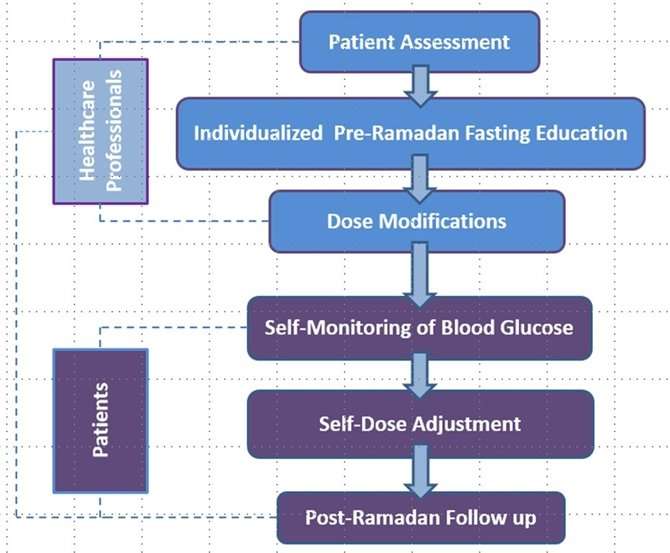Simplified flowchart showing the “Fasting Algorithm for Singaporeans with Type 2 Diabetes” (FAST). It has components that involve both healthcare professionals and patients for better diabetic management when individuals fast during Ramadan. Credit: National University of Singapore
NUS researchers have developed a clinical algorithm (flowchart) for individuals in Singapore with type 2 diabetes to manage their diabetic condition when they fast during Ramadan.
During the month of Ramadan, most Muslims who fast usually consume two meals a day, one before sunrise and the other shortly after sunset. These meals are usually high caloric food. This poses a challenge for individuals with type 2 diabetes as the food they consume may cause spikes in their blood sugar level. In type 2 diabetes, the body is unable to use the hormone insulin properly to keep blood sugar within normal levels. Although there are international guidelines with recommendations on risk assessment and medication use, they are generalised and not suitable for the local population.
A research team led by Prof Joyce LEE, from the Department of Pharmacy, NUS together with collaborators from Bukit Batok Polyclinic and Tan Tock Seng Hospital, has developed a clinical algorithm by incorporating findings from two major Ramadan related studies conducted by the team, involving more than 5,000 Singaporeans. The algorithm is specific to the observance practice and food intake of Muslims in Singapore. It provides personalised guidance on the diabetic medications taken by Muslims in Singapore so that they can better manage type 2 diabetic conditions when fasting during Ramadan. This algorithm is known as "Fasting Algorithm for Singaporeans with Type 2 Diabetes" (FAST) and has been pilot tested on a small-scale setting involving 62 patients with type 2 diabetes. FAST provides a set of medication adjustment guidelines, which healthcare professionals and individuals with type 2 diabetes can use during fasting. However, not all individuals with diabetic conditions may be suitable to fast. FAST contains a set of screening criteria to help healthcare providers in identifying those who are suited to use this algorithm. This tool can promote self-care and subsequently improve clinical outcomes of Muslims with diabetic conditions.
FAST has a sequence of clinical decisions for guiding patient care developed based on psychological and behavioural theories. It has four components: screening, education, dose modification by the healthcare provider, and dose adjustment through self-monitoring of blood glucose by patients.
Prof Lee said, "FAST appears to be promising. This prompted its implementation in a primary care medical facility and a tertiary hospital in Singapore, where its clinical and humanistic effectiveness is currently being evaluated for the past three years through a randomised clinical trial with due completion by the end of this month. This is one of the first evidence-based patient-centred clinical algorithms developed focusing on increased patient-physician interaction, self-management and individualised care."
More information: Zheng Kang Lum et al. Development of a Collaborative Algorithm for the Management of Type 2 Diabetes during Ramadan: An Anchor on Empowerment, Diabetes Technology & Therapeutics (2018). DOI: 10.1089/dia.2018.0159
Provided by National University of Singapore























